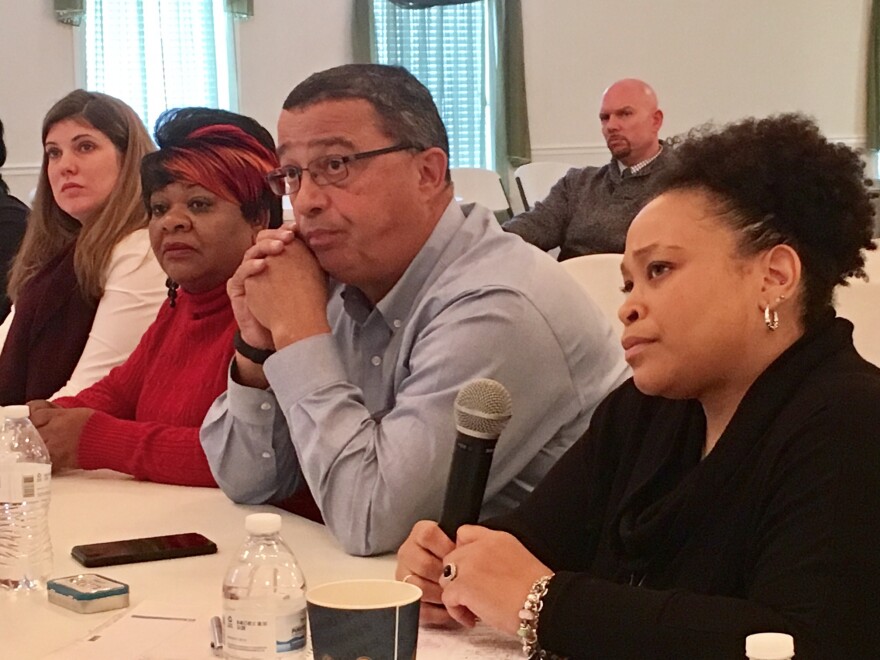The State of North Carolina is embarking on an educational experiment to open a new school district aimed at improving struggling schools. On Tuesday, the Robeson County Board of Education voted to transfer control of one of its elementary schools as the first in the new district next year.The Innovative School District is not a geographic district. Instead it’s designed to bring together low-performing public schools and hand over their management from their local school boards to an outside entity. That organization, likely a charter school operator, will be charged with turning around the schools’ performance.
The Innovative School District has stirred up uncertainty and controversy in Robeson County. But last night, the school board’s vote to turn over Southside-Ashpole Elementary to the new district was unanimous. Their decision represented a big change of heart among the community.
Michelle Shooter is the mayor of the small town of Rowland, home to the school. After the meeting, she confessed she was biting her nails while watching the vote, but she’s very excited about the outcome.
“I was trying to contain myself in there. We really thought they were going to postpone the vote. We were really hoping they wouldn’t,” Shooter explained. “I just think it’s going to mean so much to our little town and our school and those precious children.”

Mayor Shooter is not alone in her opinion. Every person who spoke about the school during the board’s public comment period urged them to vote in favor of the Innovative School District.
“In the very beginning, it was like the big bad wolf’s coming.The state’s coming in to take over a school because we’re not good enough,” Shooter said.
In November, the State Board of Education approved the school to be the first and only in the Innovative School District next school year. By law, being chosen meant Robeson County Schools had two options: turn over the school or close it.
Much of the public comment Tuesday night focused on not closing the school -- because it has a long history in the community, and because closing it would not offer students more opportunity. If the school closed, students would have to be bussed to nearby schools that are also low-performing.
“There’s no reason to send my child another 20 minutes away to another low-performing school,” said Michelle Ocean, the mother of a 4 year-old in pre-kindergarten at Southside-Ashpole Elementary. “She doesn’t deserve that. She deserves to live, learn and grow in her community.”
The Difference Between a Takeover and a Partnership
Superintendent Eric Hall has been the public face of the Innovative School District, making frequent trips to Robeson County. Hall said it’s been an interesting journey, going from initial community resistance to support.
“It’s something brand new, and anything brand new can be a little bit terrifying, if you don’t know what that really means,” Hall said.
A number of community leaders say their initial apprehension was based on misperceptions and uncertainty: would the elementary become a school of choice and push out local kids? Would it lose public funding, free lunch and bussing? Would teachers no longer be state employees, with pensions and benefits? Hall has assured them the answers to those questions is no. That eased some concerns.
Hall’s number one talking point has been to call the district a partnership, not a takeover.
“When I hear takeover, I hear something that’s aggressive, and something that’s potentially hostile,” Hall said. “To me a partnership is when you care about what the other person thinks, what the other person feels, and ultimately what are their goals out of this situation.”
Robeson County School Board members say they know the school has been low-performing for about 10 years. It has received an ‘F’ grade on its state report card for at least the last four years. According to that report card, more than a third of its third graders are held back for not reading at grade level.
Brenda Fairley-Ferebee is the Robeson County school board member who represents Rowland. She made the motion to approve the transfer.
“We had tried everything, and it’s not working. We moved principals in to the school, we moved principals out. We moved teachers in, we moved teachers out,” Fairley-Ferebee said.
Now the board is going to allow the state, Superintendent Hall, and an outside operator to move in and try something new. Fairley-Ferebee says she’s hopeful. She will serve on a panel to advise Superintendent Hall during the process of choosing a new operator for the school. She says Robeson County will expect the state to be accountable for Southside-Ashpole.
“The ultimate responsibility is the state of North Carolina, them and the Department of Public Instruction. It’s their job to make certain this school does not fail,” Fairley-Ferebee said.
Community leaders still have lots of questions. Especially concerns about what will happen to the school’s largely homegrown staff, who will likely have to interview to keep their jobs. And they’re wondering if outside managers will employ teachers who reflect the diversity of the school’s roughly 250 students, about half African-American and a third Lumbee Indian.
But the biggest looming question is whether an outside group can improve students’ test scores and get them on grade level. That is an experiment the whole state will be watching.









